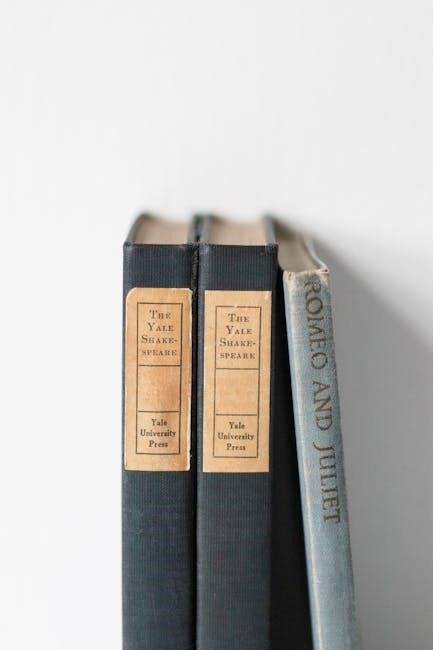Act 2 of Romeo and Juliet explores romantic tension, impulsive decisions, and the clash of families․ Key themes include love vs․ hate, fate, and loyalty, driving the tragic plot forward․
Act 2 of Romeo and Juliet is a pivotal section of the play, marking a shift from the initial conflict to the deepening romantic connection between the two protagonists․ It begins with Romeo standing beneath Juliet’s balcony, showcasing his ardent love and determination․ This act introduces key characters like Friar Laurence, who becomes a catalyst for the lovers’ union․ The balcony scene is one of the most iconic moments, highlighting Romeo and Juliet’s emotional bond․ Their decision to marry in secret sets the stage for the tragic events that unfold․ The act also explores themes of loyalty, haste, and fate, as the characters navigate their families’ animosity․ By the end of Act 2, Romeo and Juliet are married, but their happiness is short-lived, foreshadowing the inevitable consequences of their impulsive choices․
Key Themes in Act 2
Act 2 of Romeo and Juliet delves into several profound themes that shape the narrative․ Love, particularly romantic and idealized love, is central, as Romeo and Juliet’s relationship deepens․ Their bond transcends the hatred between their families, showcasing the redemptive power of love․ Fate and destiny also emerge as significant themes, with characters repeatedly referencing their belief in a predetermined course of events․ Impulsivity is another key theme, as Romeo and Juliet make hasty decisions, such as their secret marriage, which sets the stage for future conflicts․ Loyalty and betrayal are explored through characters like Friar Laurence, who stands by the lovers despite the risks, and the societal expectations that threaten their union․ These themes intertwine to create a rich tapestry that underscores the tragic inevitability of the play’s outcome․
Major Characters in Act 2
Act 2 of Romeo and Juliet introduces and develops several key characters who drive the plot forward․ Romeo, now deeply in love with Juliet, showcases his impulsive and passionate nature, leading to his secret marriage․ Juliet, though young, demonstrates remarkable maturity and determination as she navigates her emotions and societal expectations․ Friar Laurence plays a pivotal role, agreeing to marry the lovers in hopes of ending the feud between their families․ The Nurse, Juliet’s loyal confidante, provides comic relief while also revealing her protective instincts․ Mercutio and Benvolio add depth to Romeo’s character through their friendship and banter, with Mercutio’s wit highlighting Romeo’s romantic distraction․ These characters’ interactions and decisions in Act 2 set the stage for the tragic events that unfold, emphasizing their complex motivations and the ripple effects of their choices․

Scene-by-Scene Analysis
Act 2 unfolds with intense emotional tension, romantic declarations, and secretive plans․ Key scenes reveal the depth of Romeo and Juliet’s love and the escalating familial conflict․
Scene 1: The Balcony Scene
The balcony scene in Act 2, Scene 1, is one of the most iconic moments in Romeo and Juliet․ Romeo sneaks into the Capulet garden, where he overhears Juliet confessing her love for him․ He reveals himself, and they exchange vows of love․ Romeo famously compares Juliet to the sun, stating, “But soft, what light through yonder window breaks? / It is the east, and Juliet is the sun․” Juliet, unaware of Romeo’s presence, speaks of her desire to be with him, expressing her willingness to defy her family for their love․ The scene highlights the intensity of their emotions and the romantic idealism that drives them․ Their dialogue is poetic and passionate, showcasing Shakespeare’s mastery of language․ This moment sets the stage for their secret marriage and the tragic events that follow, emphasizing the power of love against the backdrop of family feud and fate․
Scene 2: Juliet’s Soliloquy

Juliet’s soliloquy in Act 2, Scene 2, is a profound expression of her deep love for Romeo and her longing to be reunited with him․ Standing alone on her balcony, she speaks of her desire to escape the constraints of her family feud and societal expectations․ She questions fate, declaring, “O Romeo, Romeo! Wherefore art thou Romeo?” This soliloquy reveals Juliet’s emotional vulnerability and her willingness to defy convention for love․ Her words are filled with passion and determination, showcasing her growth from a naive girl to a resolute young woman․ Juliet’s soliloquy is a pivotal moment, as it highlights the themes of love vs․ duty and the inevitability of fate․ Her speech is poetic and heartfelt, reflecting Shakespeare’s ability to capture the complexity of human emotions․ This scene underscores Juliet’s inner strength and her unwavering commitment to Romeo, setting the stage for the tragic events that unfold․
Scene 3: Romeo and Friar Laurence
In Scene 3 of Act 2, Romeo visits Friar Laurence, seeking his help to marry Juliet․ Romeo confesses his love for Juliet and asks the Friar to perform the secret wedding․ Friar Laurence, though initially hesitant, agrees, believing the union could end the feud between the Montagues and Capulets․ He advises Romeo to approach Juliet’s nurse to arrange the details․ Romeo’s impulsive decision reflects his passionate nature, while Friar Laurence’s acceptance highlights his hope for peace․ This scene showcases the themes of love and fate, as both characters act on their beliefs despite the risks․ The Friar’s decision sets the stage for the tragic events that unfold, emphasizing the consequences of impulsive actions and the power of love to drive human behavior․

Scene 4: The Nurse and Juliet
In Scene 4 of Act 2, the Nurse brings news from Romeo to Juliet, creating a mix of excitement and tension․ Juliet, eager to hear from her lover, presses the Nurse for details․ The Nurse, loyal but playful, teases Juliet, delaying the revelation to build suspense․ When she finally shares Romeo’s plan for a secret wedding, Juliet’s joy is palpable․ The Nurse’s role here underscores her deep affection for Juliet and her willingness to aid the young lovers despite the risks․ This scene highlights Juliet’s growing maturity and determination, as well as the Nurse’s conflicted emotions about the forbidden relationship․ The interaction between Juliet and the Nurse also foreshadows the challenges their secret will face, emphasizing the theme of loyalty amidst adversity․

Scene 5: Romeo and Juliet’s Marriage
In Scene 5 of Act 2, Romeo and Juliet secretly marry in a private ceremony officiated by Friar Laurence․ The scene is filled with hope and optimism, as the Friar believes their union may end the feud between their families․ Romeo and Juliet exchange vows, symbolizing their deep love and commitment to one another․ The marriage is a pivotal moment, showcasing their determination to be together despite the societal obstacles․ Friar Laurence’s involvement underscores his belief in the redemptive power of love․ However, the secrecy of the marriage also highlights the risks and challenges the couple will face․ This scene marks a turning point, as their happiness is short-lived, setting the stage for the tragic events that follow․ The union of Romeo and Juliet represents a fleeting triumph of love over hate, emphasizing the central theme of the play․
Scene 6: The End of Act 2
At the end of Act 2, Romeo and Juliet’s secret marriage concludes with a sense of hope and urgency․ Friar Laurence advises patience, hoping their union will end the familial feud․ Juliet returns home, informed by the Nurse of Romeo’s plan to meet her in the forest․ The scene closes with Juliet anticipating their next meeting, unaware of the impending tragedy․ This final moment of Act 2 leaves the audience with a mix of optimism and foreboding, as the lovers’ happiness is contrasted with the looming conflict․ The end of Act 2 sets the stage for the devastating events of Act 3, highlighting the fragility of their love amidst the ongoing rivalry between their families․ The conclusion underscores the themes of love, fate, and the inevitable consequences of their decisions․

Character Development in Act 2
Act 2 highlights Romeo’s impulsive nature, Juliet’s growing independence, Friar Laurence’s hopeful mediation, and the Nurse’s unwavering loyalty, showcasing dynamic shifts in their personalities and motivations․
Romeo’s Transformation
Romeo undergoes a significant transformation in Act 2, shifting from a lovesick teenager to a determined lover․ His infatuation with Rosaline fades as he falls deeply for Juliet, showcasing his romantic idealism․ Romeo’s impulsiveness is evident when he decides to marry Juliet despite the families’ feud․ His passion drives him to seek Friar Laurence’s help, revealing his willingness to defy societal norms for love․ Romeo’s transformation is marked by his growing maturity and commitment, as he transitions from a poetic lover to a man willing to risk everything for Juliet․ This change highlights his emotional depth and sets the stage for the tragic events that follow․
Juliet’s Growth

Juliet undergoes remarkable growth in Act 2, evolving from a naive, obedient daughter to a determined and independent individual․ Her iconic balcony soliloquy reveals her deep love for Romeo and her longing to escape the constraints of her family feud․ Juliet’s decision to marry Romeo in secret showcases her courage and willingness to challenge societal expectations․ She demonstrates maturity by taking charge of her destiny, sending the nurse to arrange the wedding and trusting Friar Laurence’s plan․ Juliet’s growth is further evident in her emotional resilience as she navigates the complexities of her forbidden love․ Her transformation highlights her transition from innocence to self-awareness, preparing her for the challenges ahead․ This development underscores her strength and determination, making her a pivotal character in the play’s tragic progression․
Friar Laurence’s Role
Friar Laurence plays a pivotal role in Act 2, serving as a mentor and counselor to both Romeo and Juliet․ He agrees to marry the lovers in secret, believing their union could end the feud between their families․ His decision, though well-intentioned, carries significant risks․ Friar Laurence’s wisdom and understanding of human nature are evident as he guides the young lovers, offering solace and advice․ He also provides Juliet with a potion to feign death, showcasing his resourcefulness․ Despite his good intentions, Friar Laurence’s actions inadvertently contribute to the tragic events that unfold․ His role highlights the complexities of meddling in fate and the unpredictable consequences of even the noblest plans․ Friar Laurence’s influence remains central to the play’s progression, as his choices shape the lovers’ destiny and the ultimate tragedy․
Mercutio and Benvolio
Mercutio and Benvolio are pivotal figures in Act 2, offering contrasting perspectives that shape the narrative․ Mercutio, known for his wit and humor, teases Romeo about his infatuation with Juliet, highlighting the intensity of Romeo’s emotions․ His jokes about “blind love” in Scene 1 underscore the theme of love’s unpredictability․ Benvolio, on the other hand, acts as a voice of reason, often attempting to mediate conflicts and cautioning Mercutio against provoking Tybalt․ Together, they provide a foil to Romeo’s romantic idealism, grounding the story in reality․ Their interactions reveal the camaraderie among the group while foreshadowing the escalating tensions․ Mercutio’s lively demeanor contrasts with Benvolio’s reserved nature, creating a dynamic that enriches the play’s emotional depth․ Their presence in Act 2 underscores the intricate relationships and the societal dynamics that drive the plot forward․
The Nurse’s Loyalty
The Nurse’s unwavering loyalty to Juliet is a central element in Act 2, as she serves as both a confidante and a bridge between Juliet and Romeo․ Despite her comedic relief, her dedication to Juliet’s well-being is evident․ She facilitates secret meetings and carries messages, showcasing her pivotal role in the lovers’ union․ Her loyalty is tested when she must navigate the treacherous family feud, yet she remains steadfast in her support․ The Nurse’s interactions reveal a deep maternal affection, even as she struggles with the consequences of Romeo and Juliet’s impulsive decisions․ Her character adds emotional depth, highlighting the personal stakes involved in the young lovers’ quest for happiness․ Ultimately, the Nurse’s loyalty underscores the theme of loyalty amidst chaos, making her a compassionate yet tragic figure in the play;

Themes and Symbolism
Act 2 explores themes of love vs․ hate, fate, loyalty, and light vs․ dark imagery․ Symbols like light and darkness emphasize the emotional and moral contrasts, enriching the tragic narrative․
Love vs․ Hate
In Act 2, Shakespeare vividly contrasts love and hate, highlighting their destructive and redemptive powers․ Romeo and Juliet’s love blossoms, symbolizing hope and unity, while the feud between their families intensifies hatred․ Romeo’s comparison of Juliet to the sun underscores the purity of their affection, whereas Mercutio’s mockery and Tybalt’s aggression embody the venomous rivalry․ The balcony scene captures the depth of their love, yet the shadow of hatred looms, foreshadowing tragedy․ This duality drives the plot, as love inspires risky decisions, like their secret marriage, while hate fuels violence and betrayal․ The interplay of these themes underscores the inevitability of the tragic outcome, as love struggles to overcome the entrenched hatred that ultimately consumes them․ This contrast serves as the emotional core of Act 2, shaping the characters’ choices and the play’s devastating trajectory․
Fate and Destiny
Fate and destiny play a pivotal role in Act 2 of Romeo and Juliet, as the characters’ lives become increasingly entwined by forces beyond their control․ Romeo and Juliet believe their love is destined, often referencing the stars and fate to explain their swift connection․ The balcony scene highlights Juliet’s acceptance of her fate, as she declares her willingness to risk everything for Romeo․ Friar Laurence, hoping to alter their destiny, agrees to marry them, believing their union might end the families’ feud․ However, the rushed decisions and impulsive actions of the characters suggest a tragic inevitability․ The chorus’s opening lines reinforce the idea that their fate is sealed, framing their love as “star-cross’d․” This sense of inescapable destiny underscores the play’s tragic trajectory, as the characters’ choices align with a predetermined course that ultimately leads to heartbreak and loss․
Loyalty and Betrayal
In Act 2 of Romeo and Juliet, loyalty and betrayal are significant themes that shape the characters’ actions and relationships․ Romeo and Juliet’s decision to marry in secret demonstrates their unwavering loyalty to each other, despite the bitter feud between their families․ The Nurse, a loyal confidante to Juliet, acts as a messenger between the lovers, showcasing her devotion․ However, her hesitation and ultimate loyalty to Juliet’s family hint at potential betrayal; Friar Laurence’s agreement to marry the couple reflects his loyalty to both families, as he hopes to end their hatred․ Meanwhile, the ongoing animosity between the Montagues and Capulets represents a broader betrayal of trust and peace․ These elements highlight how loyalty and betrayal intertwine, driving the play’s tragic progression and emphasizing the consequences of divided loyalties in Verona’s conflict-ridden society․
Symbols in Act 2

In Act 2 of Romeo and Juliet, various symbols enrich the narrative, reinforcing themes of love, conflict, and fate․ Light and darkness are prominent, with Juliet comparing Romeo to the sun, symbolizing his radiant presence in her life․ The moon, often associated with Juliet, represents her purity and vulnerability․ The balcony itself becomes a symbol of separation and longing, as Juliet stands above, while Romeo gazes up from below․ The dagger, mentioned by Juliet, foreshadows the tragic violence that will unfold․ Additionally, the rose is a recurring symbol, with Romeo declaring his love for Juliet “without the thorns,” highlighting the beauty of their relationship amidst the thorny feud between their families․ These symbols deepen the emotional and thematic complexity of the act, underscoring the lovers’ hope and the inevitable darkness that looms over their story․
Act 2 of Romeo and Juliet establishes pivotal moments, as the lovers’ decisions escalate tensions․ Their secret marriage and the deepening feud highlight the inevitability of tragic consequences, shaping the play’s outcome․

Act 2 of Romeo and Juliet is marked by significant events that deepen the plot and character relationships․ Romeo’s infatuation with Rosaline transitions to his profound love for Juliet, culminating in their secret marriage․ The balcony scene showcases Juliet’s independence and Romeo’s passionate devotion․ Friar Laurence, hoping to end the feud, agrees to marry the lovers, while the Nurse acts as a loyal intermediary․ Juliet’s soliloquy reveals her maturity and determination․ The act concludes with the clandestine wedding, setting the stage for future conflicts․ Themes of love, fate, and loyalty dominate, highlighting the tragic consequences of impulsive decisions․ Character development emphasizes Romeo’s romantic idealism, Juliet’s growth, and the supportive roles of Friar Laurence and the Nurse․ These elements collectively advance the play’s tragic trajectory, underscoring the destructive nature of unresolved conflicts and hasty choices․

Leave a Reply
You must be logged in to post a comment.